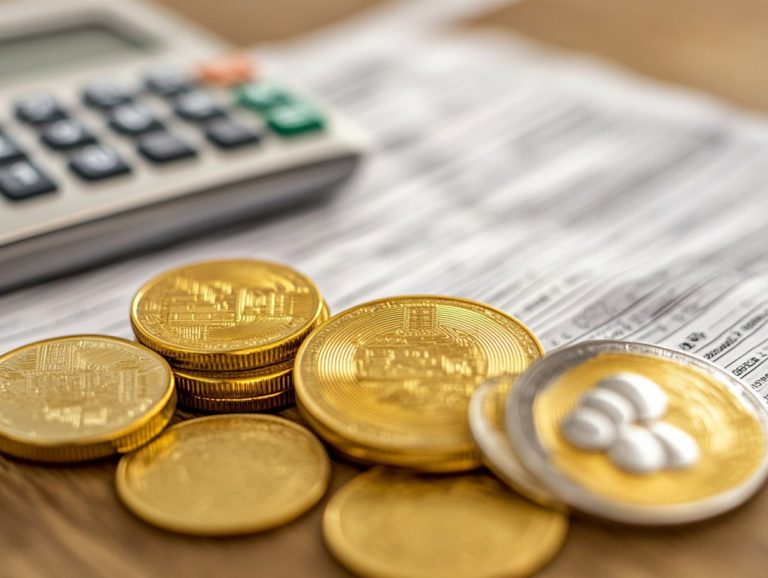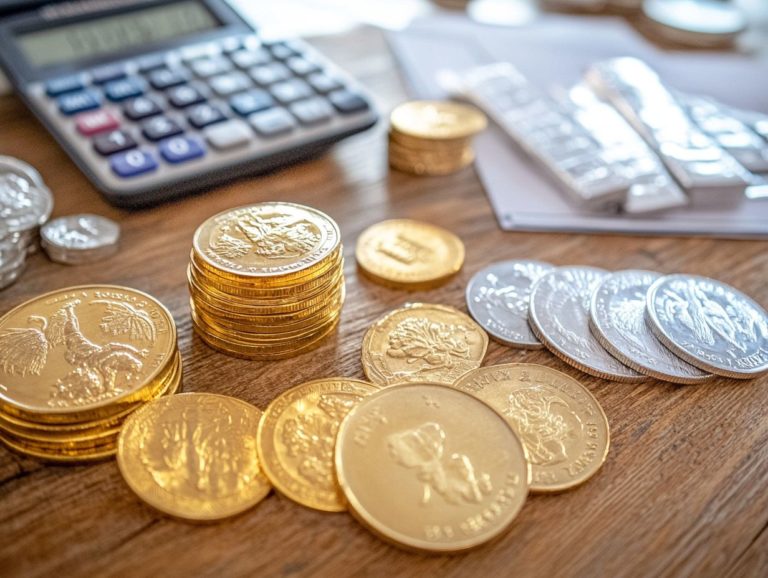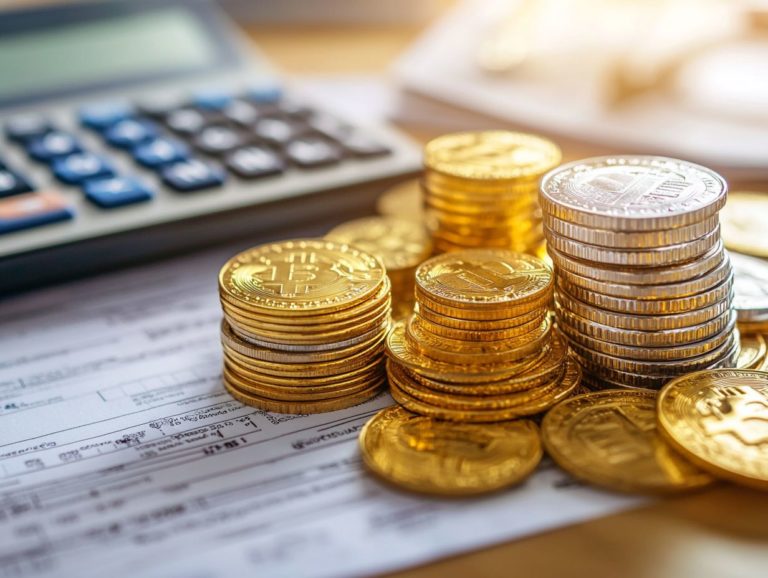The Importance of Tax Planning for Precious Metals Investors
Investing in precious metals can be a highly rewarding endeavor, but understanding the tax implications is essential for maximizing your profits. Consider working with a tax professional to enhance your investment strategy.
This guide covers essential tax planning for precious metals investors. You ll learn about various taxes, including capital gains and inheritance tax, as well as strategic approaches such as portfolio diversification and the timing of your sales. Explore the insights provided here to ensure your precious metals investments yield the highest returns possible!
Contents
- Key Takeaways:
- Understanding Tax Planning for Precious Metals Investors
- Benefits of Tax Planning for Precious Metals Investors
- Types of Taxes that Affect Precious Metals Investors
- Strategies for Tax Planning in Precious Metals Investments
- Working with a Tax Professional
- Frequently Asked Questions
- What is tax planning and why is it important for precious metals investors?
- Do precious metals investors have to pay taxes on their investments?
- What are some tax strategies that can benefit precious metals investors?
- What are the potential consequences of not having a tax plan for precious metals investments?
- How often should precious metals investors review their tax plan?
- Are there any tax benefits specific to investing in precious metals?
Key Takeaways:
- Tax planning can help precious metals investors maximize profits and minimize losses.
- Being aware of taxes that can affect precious metals investments, such as capital gains and income taxes, is crucial for successful tax planning.
- Strategies such as diversifying your portfolio, timing sales, and utilizing tax-advantaged accounts can all play a role in effective tax planning for precious metals investments.
Understanding Tax Planning for Precious Metals Investors
Understanding tax planning is essential for you as a precious metals investor. It involves strategically managing your tax obligations and implications linked to your investments.
As someone investing in gold, silver, or platinum, you need to understand tax laws to optimize your tax liabilities while staying compliant with legal requirements.
By planning your taxes carefully, you can uncover opportunities to minimize your capital gains tax, take advantage of tax-advantaged accounts, and potentially sidestep financial penalties.
Consulting a tax professional can significantly enhance the effectiveness of your strategies. They ensure you’re in line with current tax policies.
What is Tax Planning?
Tax planning is about analyzing your financial situation to employ the most tax-efficient strategies. This way, you can meet your tax obligations while keeping those liabilities to a minimum.
To do this effectively, you need a comprehensive understanding of various factors, including your income streams, allowable deductions, credits, and the tax laws that might impact you or your business.
For investors, staying informed about evolving tax regulations is particularly advantageous. This insight enables you to make well-informed decisions. By evaluating your unique financial landscape, you can develop tailored investment strategies that align with your risk tolerance and long-term objectives.
Ultimately, a skilled approach to tax planning not only protects you from potential pitfalls but also enhances your wealth accumulation over time.
Benefits of Tax Planning for Precious Metals Investors
Engaging in tax planning presents a wealth of advantages for precious metals investors. By proactively managing your tax obligations, you can leverage a range of investment strategies tailored to your financial goals, effectively reducing your capital gains tax and enhancing your overall returns.
Moreover, astute tax planning safeguards you from the financial penalties associated with tax evasion, ensuring compliance with tax laws and regulations along the way.
Maximizing Profits and Minimizing Losses
Maximizing profits while minimizing losses is essential for successful tax planning as an investor in precious metals, particularly regarding capital gains tax implications.
By employing specific strategies like tax loss harvesting, you can offset your gains with losses, effectively reducing your taxable income. Understanding the timing of your sales is also crucial; strategically selling assets during low-income years can significantly lower your tax burden.
Leveraging tax-efficient investment strategies such as utilizing retirement accounts or investing in exchange-traded funds (ETFs) focused on precious metals can open up additional avenues for tax advantages. Implementing these tactics will ensure a more robust financial strategy, enhancing your overall investment returns while safeguarding against unexpected tax liabilities.
Don t miss out on maximizing your returns! Start planning your tax strategies today!
Types of Taxes that Affect Precious Metals Investors
As a precious metals investor, you face various taxes that can significantly impact your financial strategy. These include capital gains tax, inheritance tax, and income tax. Each tax has different implications and reporting requirements, making it essential to fully understand your tax liabilities.
Thorough estate planning is crucial for reducing these taxes, helping you protect and preserve your wealth for future generations.
Capital Gains Tax
Capital gains tax is pivotal for precious metals investors, as it directly impacts the profits from selling these assets and your overall tax obligations.
To navigate this tax landscape, it s essential to understand how it s calculated. Typically, you ll need to determine the difference between the sale price and your original purchase price for the metal. When tax season arrives, be ready to report these gains using specific forms, such as Form 1099-B and Form 8949, which require careful documentation of your transactions.
To reduce your tax burden, consider these strategies:
- Hold your investments for over a year for lower capital gains rates.
- Utilize tax-advantaged accounts, which are special savings accounts that help lower the taxes owed on your investments.
Inheritance Tax
Inheritance tax can significantly affect your investments in precious metals. It determines the tax liabilities on inherited assets, highlighting the importance of careful estate planning.
If you ve built wealth in gold, silver, or other precious metals, the implications of inheritance tax can be substantial. It not only impacts your family’s financial situation but also influences how you choose to pass these assets on.
By proactively planning your estate, you can explore strategies like establishing trusts or gifting assets during your lifetime to lower tax burdens. These measures help ensure your loved ones receive the maximum value from their inheritance, preserving your family wealth for generations to come.
Income Tax
Income tax is significant for precious metals investors, as it applies to any dividends and interest earned from your investments.
This tax consideration can greatly impact your overall returns, especially if you are actively trading or holding assets that generate passive income. Recognize that interest and dividends are usually taxed at ordinary income rates, which can be steeper than the capital gains rates for selling precious metals like gold and silver. Understanding the role of precious metals in a tax-efficient portfolio can help you make informed decisions.
Effective tax planning strategies, such as using tax-advantaged accounts or consulting a tax professional, can help you manage these liabilities. By understanding the relevant tax brackets and potential deductions, you can maximize your net gains while ensuring compliance with tax regulations.
Strategies for Tax Planning in Precious Metals Investments
Implementing effective tax planning strategies for precious metals investments can lead to substantial financial benefits. These strategies help you navigate the complexities of tax laws while optimizing your returns.
Utilize tax-advantaged accounts, such as IRAs or 401(k)s, and employ timing strategies for your sales to significantly reduce your tax liabilities while maximizing your gains.
Techniques like tax loss harvesting can enhance your investment strategy, allowing you to get the most from your precious metals portfolio.
Understanding these taxes is crucial for maximizing your investments. Take action now to protect your wealth and secure your financial future. Ready to optimize your tax strategy? Start planning your investments today!
Diversifying Your Portfolio
Diversifying your portfolio is an essential strategy in tax planning for precious metals investors, as it helps reduce risks while enhancing your overall investment returns.
By incorporating a variety of precious metals gold, silver, platinum, and palladium you can craft a more balanced distribution of your assets that decreases reliance on any single market sector. This approach not only spreads out risk but also takes advantage of the unique performance characteristics of each metal, which often move independently from traditional stocks and bonds.
Use tax-efficient strategies, like holding investments in tax-advantaged accounts accounts that offer tax benefits, like IRAs and 401(k)s to enhance diversification benefits. This helps achieve stable long-term growth and reduces the effects of bad market conditions.
Timing Your Sales
Timing your sales is a key element of tax planning, as it can significantly impact the capital gains taxes you owe on your precious metals investments.
For example, grasping market fluctuations allows you to pinpoint the optimal moments to sell, particularly when prices surge due to geopolitical tensions or economic shifts. It s essential to keep a close eye on interest rates and inflation rates, as these factors can heavily influence precious metals prices.
By selling strategically during periods of lower income, you can effectively minimize your tax burdens, paving the way for more favorable financial results. Always consider the corresponding market conditions to refine your strategies, enhance potential returns, and boost overall investment success.
Utilizing Tax-Advantaged Accounts
Utilizing tax-advantaged accounts, like IRAs and 401(k)s, can elevate your tax planning for precious metals investments, bringing a suite of benefits and strategic tax advantages.
These accounts enable you to defer taxes on both contributions and earnings, leading to strong growth over time without the immediate tax obligations commonly associated with standard investment accounts. By sheltering precious metals, such as gold and silver, within these tax-advantaged vehicles, you can potentially minimize capital gains taxes when you eventually sell those assets. It’s also important to understand the tax responsibilities of precious metals investors to navigate your financial strategy effectively.
This methodical approach not only helps your investment gains accumulate in a tax-efficient manner, but it can also lead to lower taxable income during retirement. With this effective tax planning strategy, you can preserve more of your wealth while capitalizing on the growth potential of precious metals in your financial strategy over time.
Working with a Tax Professional
Engaging a tax professional can be immensely advantageous for precious metals investors. Their specialized knowledge and expertise allow you to understand the complicated world of tax planning with confidence.
A tax professional will help you comprehend the complexities of tax laws and regulations, ensuring you remain compliant while optimizing strategies tailored specifically to your precious metals investments. By consulting a qualified tax expert, you enable yourself to make informed decisions and sidestep potentially costly missteps related to your tax obligations and implications. Understanding the importance of tax compliance for precious metals investors is crucial in this process.
Benefits and Considerations
Working with a tax professional offers more than just compliance; they provide invaluable insights tailored specifically to tax planning for your precious metals investments.
By leveraging their expertise, you can develop personalized tax strategies that align with your financial objectives, effectively minimizing liabilities while maximizing your potential returns. A tax professional will conduct a thorough risk assessment, pinpointing potential pitfalls that you might easily overlook.
Always consider factors like the professional’s experience with similar assets, their familiarity with current tax laws, and their capacity to offer tailored advice. Ultimately, this collaboration can lead to more informed decision-making and a significant boost in your financial security.
Frequently Asked Questions
What is tax planning and why is it important for precious metals investors?
Tax planning helps you organize your finances to lower your tax bill. This is vital for precious metals investors because it can save money and boost your investment returns.
Do precious metals investors have to pay taxes on their investments?
Yes, taxes apply to precious metals investments. Smart tax planning can lower your tax burden and enhance your profits.
What are some tax strategies that can benefit precious metals investors?
One effective strategy is to hold precious metals in a tax-advantaged retirement account, like a self-directed IRA (an investment account allowing you to control your assets). Another is tax-loss harvesting, where you sell underperforming assets to balance out gains from your precious metals.
What are the potential consequences of not having a tax plan for precious metals investments?
Without a tax plan, you could pay higher taxes on your profits and miss valuable deductions. This may greatly affect your overall returns and financial objectives.
How often should precious metals investors review their tax plan?
Review your tax plan at least once a year or whenever tax laws change that could impact your investments. Consulting a tax advisor is also wise to ensure your plan is tailored to your needs.
Are there any tax benefits specific to investing in precious metals?
Yes, precious metals investors can enjoy tax benefits like deferring taxes on gains until you sell the metals. You may also qualify for lower long-term capital gains tax rates compared to regular income tax rates.













